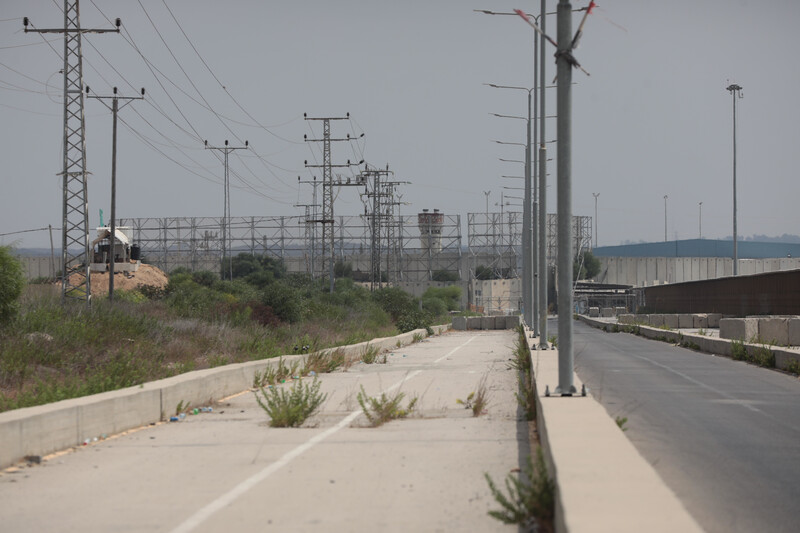The Electronic Intifada 28 September 2022

A view of the road to the Erez checkpoint in northern Gaza, where Ahmed Abu Jazar’s family waited for him to return home after his nearly two decades of imprisonment.
APA imagesFor Aisha Mousa Abu Jazar, the morning of 18 August felt like Eid morning: full of joyful anticipation of the day ahead. The Abu Jazar family left their home in Rafah in the southern Gaza Strip and traveled north, to the Erez checkpoint.
“I spent the whole way thinking of the moment I would finally see my son again,” Aisha, 67, said. “I was imagining how I would hug him and cry and tell him how difficult life was without him but also how we would celebrate his release.”
Aisha’s son, Ahmed Abu Jazar, 37, had been in Israeli prison for nearly two decades, since December 2003. Now, finally, he was set to be released.
Yet, as the family waited at the Israeli military checkpoint, they received a phone call from Khaled Zabarqa, Ahmed’s lawyer. Israeli occupation authorities had just informed him of a six-month detention renewal order against Ahmed.
This meant Ahmed would not be released from prison for another six months.
Aisha was devastated. “This is the second time the occupation spoils our joy, she said. “I am afraid of dying before I can embrace my son.”
Indeed, this is the second time Israel has extended Ahmed’s initial 17-year sentence. The first instance was in 2019, after the end of Ahmed’s initial sentence, when Israel extended his imprisonment by 20 months.
Now, Ahmed has been in prison for a total of 19 years, with another six months remaining.
“Ahmed’s detention was renewed two times based on ‘unspecified reasons,’” said Khaled Abu Jazar, 43, Ahmad’s brother.
This has left both Ahmed’s family and his lawyer in the dark on why, exactly, Ahmed is still in prison despite the end of his sentence, though Ahmed’s lawyer stated that one possible reason is that Ahmed was allegedly in possession of a mobile phone.
Arrested at the age of 18
As of September 2022, Israel imprisons some 4,650 Palestinians. They include 743 Palestinians in administrative detention (imprisonment without charge or trial), according to Addameer, a prisoners’ rights organization.
“Israeli occupation authorities continue to place Palestinians under administrative detention indefinitely based on ‘secret material’ that is neither disclosed to the detainees nor their lawyers,” Addameer reports.
“In addition, administrative detention is regularly employed as a coercive and retaliatory measure targeting Palestinian activists, civil society members, students, former prisoners and their family members.”
Ahmed was arrested – at the age of 18 – in December 2003, at the Abu Holy checkpoint, which divided Gaza’s south and north.
“In 2003, we were traveling to Gaza City to shop and to buy Eid clothes when the [Israeli] soldiers suddenly blocked the road,” Khaled, Ahmed’s brother, said.
The soldiers started searches on the Palestinians at the checkpoint, “assaulting some and humiliating others,” Khaled said. “At that time, Ahmed and about five people of his age were detained.”
Khaled said Ahmed was arrested and charged due to his “affiliation with the Islamic Jihad in Gaza.”
Israel regularly arrests and detains youths and children. Currently, Israel imprisons 180 children.
The United Nations Convention on the Rights of the Child, signed by Israel, stipulates that the detention and imprisonment of children should be used “only as a measure of last resort and for the shortest appropriate period of time.”
One 45-minute visit in 19 years
Even in the cases of youths and children, Israel restricts visits to imprisoned Palestinians.
Israeli authorities, citing unspecified security reasons, can suspend or outright reject family visits to prisoners.
In Ahmed’s case, he has been permitted only one visit from family while imprisoned. That was in 2015, when his mother Aisha visited him for 45 minutes.
“On the day of the visit, I met Ahmed in the visiting room,” she said. “There was a glass window separating us. I talked to him via a telephone.”
She said that when she saw him, “my heart almost shot out of my body.”
“I begged the prison guards to allow me to touch or hug my son. But in the prison physical contact with the detainee is generally forbidden.”
Since then, Ahmed has not been permitted any visits.
“Israel policy is effectively barring all means of communication between prisoners from Gaza and the outside world,” Khaled Abu Jazar said. “We are not allowed to even hear Ahmed’s voice via a phone call. We don’t even know where they are holding him.”
Khaled said that they occasionally get news from former detainees. Recently they heard that Ahmed had obtained a master’s degree and that he was working on his Quranic recitation.
After two years of Israel suspending visitation permits due to COVID-19, the International Committee of the Red Cross facilitated the visits of a number of Palestinian families from Gaza to their relatives in Israeli prisons in March 2022.
Over the years, many detainees have gone on hunger strike to protest their imprisonment. This form of nonviolent protest can be an expression of anger at Israel for arbitrarily renewing detention orders and extending already lengthy sentences.
“We call on the world to support Ahmed and all Palestinian detainees in their plight and struggle to ensure respect for their rights that are guaranteed by international law,” Khaled Abu Jazar said.
As Ahmed’s next release date, in February 2023, draws near, his family again anticipates his return.
They built him a new house in Rafah and are planning to find him a bride so he can finally have a family.
Rajaa Salah is a freelance writer and translator from Gaza, Palestine.




